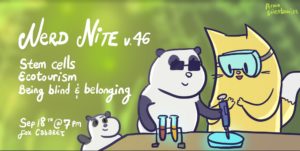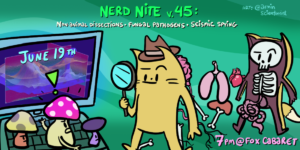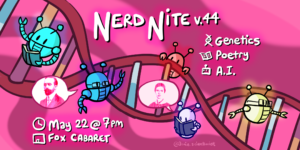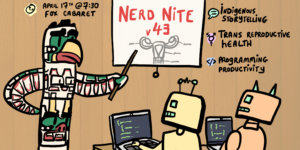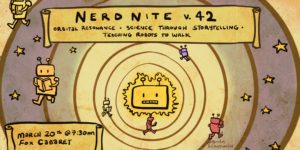Nerd Nite v.46 Stem Cells, Ecotourism, and Being Blind and Belonging
SciFact vs. SciFiction: Nerd Nite Goes to the Movies v4. Evolution
Our final episode in VIFF and Nerd Nite’s summer movie series takes us into the world of genetics with Dr. Greg Bole who teaches Evolution, Ecology, and Genetics at the University of British Columbia! Tonight he’ll join Michael from Nerd Nite and special guest host Dr. Carin Bondar to discuss the sci-facts in a variety of clips from movies about genetics and evolution!. We’ll be discussing the science of classics like Gattaca and Jurassic Park, but also more recent films like Annihilation.
When: Aug 28
Where: Vancouver International Film Centre
When: 7:30 – 9:00 – This talk will be followed by a screening of Errol Morris’ “Gattaca” at 9:30 pm. Double bill price: $20
Tickets: Here
SciFact vs. SciFiction: Nerd Nite Goes to the Movies v3. Disasters
VIFF and Nerd Nite’s movie series is back! This time we’ll focus on disaster and apocalyptic themes with geophysicist, disaster researcher, and sci-fi scientist Mika McKinnon. Tonight she’ll join Kaylee and Michael from Nerd Nite to discuss the sci-facts in a variety of clips from movies that cover topics from a variety doomsday scenarios. We’ll be discussing the science of movies like Mad Max, The Day After Tomorrow, and Sharknado!? Buckle up.
When: Aug 14
Where: Vancouver International Film Centre
When: 7:30 – 9:00 – This talk will be followed by a screening of Errol Morris’ “A Brief History of Time” at 9:30 pm. Double bill price: $20
Tickets: Here
SciFact vs SciFiction: Nerd Nite Goes to the Movies v.2 The Univers
SciFact vs. SciFi: Nerd Nite Goes to the Movies. “The Universe According to Hollywood.” Presented by Dr. Douglas Scott. This evening we blast off into space with astrophysicist Dr. Douglas Scott from the University of British Columbia who specializes in cosmology. Dr Scott joins Kaylee and Michael from Nerd Nite to discuss the sci-facts in a variety of clips from movies set in outer space. We’ll be discussing the science of classics like Star Wars and Star Trek, but also modern films like Interstellar and more.
When: July 31
Where: Vancouver International Film Centre
When: 7:30 – 9:00 – This talk will be followed by a screening of Errol Morris’ “A Brief History of Time” at 9:30 pm. Double bill price: $20
Tickets: Here
SciFact vs SciFiction: Nerd Nite Goes to the Movies v1. Animals
This summer we’re trying something a little different. Our new summer series of talks – a collaboration between Nerd Nite and VIFF – examines the pseudo-science propagated by Hollywood, and seeks to sift real insights from fake facts, in a fun, playful but peer-approved format. Each show will feature clips from a variety of movies on a science theme with a featured scientist on hand all doneNerd Nite style with drinks! We begin with biology, and our first presenter is Dr Carin Bondar.
Dr Bondar has been the host of Science Channel’s Outrageous Acts of Science, and she’s the author of several books including “Wild Moms: The Science Behind Mating in the Animal Kingdom”. Tonight she’ll join Kaylee and Michael from Nerd Nite to discuss the sci-facts in a variety of clips from cinema. We’ll be discussing the science in Planet of the Apes, The Birds, Arachnophobia, Snakes on a Plane, and more!
When: July 10
Where: Vancouver International Film Centre
When: 7:30 – 8:30 – This talk will be followed by a screening of Alfred Hitchcock’s classic The Birds (9pm). Double bill price: $20
Tickets: Here!
Nerd Nite v45. Non-Animal Dissections, Fungal Pathogens, and Seismic Spying
As the Earth nears its complete tilt towards the Sun, we are also halfway through what has quickly become Nerd Nite’s biggest year in Vancouver. We can’t thank you enough for helping us grow this community of adult learning, and we’ll be announcing our fun new summer movie series very soon, but for now we have some important nerding to do. June 19th is not only the anniversary of the first woman in space, Valentina Tereshkova, but also it’s National Cocktail day. In 1806 the very first definition read as follows “Cock-tail is a stimulating liquor, composed of spirits of any kind, sugar, water, and bitters—it is vulgarly called bittered sling, and is supposed to be an excellent electioneering potion, in as much as it renders the heart stout and bold, at the same time that it fuddles the head.”
Let’s fuddle the head with knowledge and potions!
Where: The Fox Cabaret
When: Wednesday June 19th; Doors @ 7, show starts @ 7:30
Tickets: Eventbrite
Hosted by: Kaylee Byers and Michael Unger
DJ Bürger – Grant Francis Minor
Poster: Armin Mortazavi
IG: @armin.scientoonist
1. Non-Animal Dissections
Dr. Elisabeth Ormandy
Bio: Dr. Elisabeth Ormandy is a former neuroscientist who has spent her career getting to know animals better, on their terms. After retraining in animal behaviour, welfare, and ethics she now uses her science savvy to advocate for the advancement of science without suffering. Elisabeth is co-founder and executive director of the Animals in Science Policy Institute (AiSPI), a Vancouver-based national charity. She is an instructor at the University of British Columbia, an Advisor to both the Canadian Centre for Alternatives to Animal Methods, and the Humane Education Coalition. She is part of the editorial team for the Alternatives to Laboratory Animals journal, and also gives national policy advice to the Canadian Council on Animal Care on a regular basis.
2. The Potential Perils of Brain Eating Fungi!
Linda Horianopulos
From leaf litter on the forest floor, to the sugars in human brains, fungi can feed on all sorts of things. The brain eating fungi have particularly intrigued researchers, leading them to speculate about the possibility of “zombie fungi”. In fact, in the insect world, it is well documented that fungi including Cordyceps infect insect hosts and control their behaviour to increase the spread of the fungal pathogens. But could they affect people in the same way? The human fungal pathogen Cryptococcus neoformans disseminates throughout the body and grows well in the brain where it finds and feeds on one of its favourite sugars. We’ll explore the world of brain eating fungi and speculate on whether a human mind control fungus could reasonably evolve.
Bio: Linda is a PhD candidate with a fascination for fungi! Mushrooms are cool, but the underappreciated fungal pathogens are what really get her excited. She keeps a ukulele in the lab to pass the time and a soccer ball under her desk to hone her foot skills, after all it’s all about work-life balance, right?
3. Seismic Spying: You Can’t Keep Secrets from Rocks
Mika McKinnon
Seismology isn’t just for earthquakes. Geophysicists use seismic signals to spy on everything from bomb tests and traffic jams to crashing waves and lover’s lanes. A signal is just the noise you’re looking for, and our planet is humming in its eagerness to spill subsurface secrets.
Bio: Mika McKinnon is a geophysicist, disaster researcher, and scifi scientist. As your friendly neighbourhood geoscientist, when she’s not creeping on seismic signals, she offers tasting notes on rocks, tweaks party planning to enhance disaster preparedness, and obsesses over impending doom. McKinnon scrawls equations and establishes plausibility for shows including Stargate, Star Trek, and [redacted]. Her writing appears in Wired, io9, Vox, and more. She shares her press passes (and social media) with a bevy of mischievous plush creatures.
Nerd Nite v44: Genetics, Poetry, and Artificial Intelligence
May 22nd is National Goth Day. The Goths’ reputation as barbarians is mostly fake news that got told from the perspective of the ego-torn Romans who got their ass handed to them in 410 CE. For the most part Goths were peaceful hunters and farmers who were very sophisticated when it came to trade, diplomacy, and agriculture. It’s no wonder that these outcasts would become the inspiration for your Gr.9 self, when perhaps you first heard the dulcet tones of Robert Smith tell you that it was okay for boys to cry, practiced your spastic Ian Curtis dance moves in the mirror, and wore eyeliner just like Siouxie. So pull your black leathers and lace and get in here for the 44th version of Nerd Nite, where we have three amazing nerds to talk about genetics, poetry, and artificial intelligence!
Hosted by: Kaylee Byers and Michael Unger
DJ Bürger – Grant Francis Minor
Poster: Armin Mortazavi
IG: @armin.scientoonist
Where: The Fox Cabaret
When: Wednesday May 22nd; Doors @ 7, show starts @ 7:30
Tickets: Eventbrite
1. Can Artificial Intelligence Learn Chemistry/Physics?
Rodrigo A. Vargas–Hernández
Machine learning (ML) algorithms are used extensively in daily tasks such as language translation, image recognition, and navigation systems to mention a few. In this talk, I will explore how the fields of chemistry and physics have benefited from the use of ML algorithms. ML is divided into three main fields, (i) supervised learning, (ii) unsupervised learning and (iii) reinforcement learning. During the talk, I will explain how one can reformulate some chemistry/physics problems in terms of each field of ML. The results I will present illustrate how ML can help us predict material properties, similarities between chemicals and new synthetic routes, and the synthesis of chemical compounds without human intervention using robots and computers.
2. Poetry is Fucking Fun
Dina Del Bucchia
The worst part of being a poet, and being someone who enjoys poetry, is all the jerks who say they aren’t interested in poetry, don’t read poetry, just don’t get poetry. What everyone who limits their exposure to poetry is doing to themselves is making sure they’re having a less good time. In fact, poetry is very similar to actual popular art forms. Performed on stage poetry can be as hilarious and engaging as a night at a comedy club. On the page it has the capacity to go deep on subjects normally reserved for op-eds. Or to talk about human emotions we see reflected on TV and film. The musicality of a hit song is present in poetry’s rhythm and meter. See? It’s really not so different from other pop culture. Converting people into poetry readers is the only conversion therapy I support.
Bio: Dina Del Bucchia is an otter and dress enthusiast originally from the village of Fruitvale, BC. She is the author of the short story collection, Don’t Tell Me What to Do, and four collections of poetry: Coping with Emotions and Otters, Blind Items, Rom Com, written with Daniel Zomparelli, and the newly released, It’s a Big Deal! She is a senior editor of Poetry Is Dead magazine, the Artistic Director of the Real Vancouver Writers’ Series and hosts the pretty literary podcast, Can’t Lit, with Jen Sookfong Lee. You can find out more about her at: dinadelbucchia.com.
3. Genetics
Avery Noonan
From new ideas to recounting history, language enables us to externalize our thoughts and share our ideas with the world. With the familiar characters “ATCG” and the resemblance of a code with rules and syntax, it is easy to think of our DNA as the language of life. However, instead of being used to communicate our ideas and thoughts, the language of DNA encodes our biological past, present, and future. In an era where you can order a kit online to sequence parts of your genome and synthesize a gene for the price of a taxi home to the suburbs, reading and writing the language of life has become a common practice in medicine, agriculture, manufacturing, environmental monitoring and the study of the natural world. However, unlike the language you speak with your friends, humanity didn’t invent DNA to represent our own thoughts, and we are still working on understanding its intricacies. Much like copying out the characters of a language you don’t speak, context is everything and meaning is often lost in translation. We are going to explore the extent to which we can read and write the genetic code, and the challenges of speaking a language we are only beginning to understand.
Bio: Avery Noonan is a Toronto-born, BC-raised graduate student at the University of British Columbia. He is interested in biking, hipster cocktail bars, beach volleyball, hip hop and the engineering of microbial metabolisms to build, breakdown and detect material in an environmentally sustainable way, and the development of genetic tools for these purposes.
Nerd Nite v.43: Trans Reproductive Health, Programming Productivity, and Indigenous Storytelling
On April 17th 1964, Jerrie Mock became the first woman to fly a plane solo around the world. Lasting just under one month, Jerrie flew her plane “Charlie” nearly 37,000 km. Join us this month for amazing adventures of another sort. We’re delving into indigenous storytelling, trans reproductive health, and programming productivity – we’re excited to go on this nerd journey with all of you!
Poster by: Armin Mortazavi IG: @armin_mortazavi
Where: The Fox Cabaret
When: Wednesday April 17th; Doors @ 7, show starts @ 7:30
Tickets: Eventbrite
This month:
1. Indigeneous Storytelling
Dallas Yellowfly
Indigenous storyteller Dallas Yellowfly brings Qwalena: The Wild Woman Who Steals Children to life in this unique theatrical multimedia storytelling presentation. The purpose of this presentation is to create awareness on the inter-generational impact of Indian residential schools. Qwalena is the allegorical creature that represents the Indian agents who stole Aboriginal children from their families and forced them into government funded Indian residential schools. Yellowfly’s own father was one of these children.
Bio: Indigenous storyteller Dallas Yellowfly is from the Siksika Nation (Blackfoot First Nation). Having been born and raised on Coast Salish, Sto:lo, territory he has been taught both coastal culture and plains culture from Elders. Dallas has been working in Aboriginal Education for 17 years. Using his experience in stand-up comedy and storytelling Dallas is presenting across the province focused on increasing awareness of Indigenous perspectives in education.
2. Programming Productivity
Ducky Sherwood
Especially in computer programming, there is common knowledge that productivity varies by more than an order of magnitude between different people. In this talk, I will show how that is utter bullshit. While I will not be able to magically make everybody an order of magnitude more productive at everything, I will show you a few research-proven techniques to make problem-solving faster, explain a little about the neuroscience behind it, and – perhaps most importantly – give you tools to think more productively about individual and team productivity.
Bio: Kaitlin Duck Sherwood has been interested in productivity for many years. She studied programmer productivity in the course of getting a MSc in computer science, and wrote the books Overcome Email Overload with Microsoft Outlook 2000 and 2002 and Overcome Email Overload with Eudora 5. Among her many jobs, she was a Senior Product Designer for the Open Source Application Foundation’s personal information manager project, and wrote an email program for a tablet computer project at Interval Research.
3. Trans-Reproductive Health
A.J. Lowik
Join me in untangling the complicated relationships between sex, gender and reproduction where men can get pregnant, women can produce sperm, and non-binary people navigate menstruation, among other things – trans people lead rich reproductive lives and are using their bodies in ways that health care providers aren’t always equipped to handle. What does trans-inclusive reproductive health care look like? What are the obstacles for trans people who are navigating their gender identities and expressions, as well as their reproductive capacities and desires? When embodied reproductive experiences are affixed to specific bodies and assumed to belong to specific genders, we end up with gendered silos of health care delivery and service – and trans people’s reproductive health care needs are frequently overlooked and unmet. Let’s expand our understanding of reproductive justice to include trans people in all their complexities!
Bio: A.J. Lowik is a PhD Candidate with the Institute for Gender, Race, Sexuality and Social Justice at the University of British Columbia, where they study all facets of trans people’s reproductive lives from menstruation to abortion to lactation and chest-feeding. They teach Intro to Trans Studies, and help all kinds of organizations on their path towards trans-inclusion, including schools and teachers, reproductive and other health care providers, yoga studios and more. They are currently working on an edited collection called “Reproduction and Parenting Beyond the Binary,” which will highlight non-binary people’s experiences with reproduction, fertility, parenthood and family. A.J. loves board games, cats, and their cozy home with partner Michelle.
Nerd Nite v42. Orbital resonance, Science Through Storytelling, and Teaching Robots to Walk
Happy Nowruz! It is a new day. a day that if you were Persian you would be celebrating a new year. It’s a special day for many reasons, the Earth has tilted back towards the sun, and has hit equilibrium. Things are springing anew around us, it’s a time to get things growing in our lives, which for us here at Nerd Nite, means learning together. So no matter how you celebrate this day, let’s celebrate it together, because after all this is the 42nd edition of Nerd Nite so let’s seek the “The Answer to the Great Question… Of Life, the Universe and Everything”.
Poster by: Armin Mortazavi IG: @armin_mortazavi
Where: The Fox Cabaret
When: Wednesday March 2oth; Doors @ 7, show starts @ 7:30
Tickets: Eventbrite
1. Orbital Resonance
Christa Van Laerhoven
We generally think of planets (and the smaller stuff, too) as going about their orbits, minding their own business. In actuality, our Solar System is a giant interact-a-thon, as fellow planetary bodies perturb each other via gravity. I will talk about a kind of interaction called orbital resonance and a way to diagnose that this particular kind of interaction is happening. The cast celestial characters that will help me demonstrate these concepts includes Neptune and everyone’s favourite not-a-planet Pluto.
Bio: Christa Van Laerhoven is a valley girl from Agassiz and a postdoctoral fellow at UBC, studying what she likes to call ‘orbital shenanigans’ (how the orbits of planets, asteroids, and moons can change over time). She has a PhD from the Department of Planetary Sciences, University of Arizona and a B.Sc. from UBC in Physics and Astronomy (Honours).
2. Science Through Storytelling
Kristi Charish
Ask any gamer who’s played the sci-fi video game series Mass Effect about the genophage and they will spin you a tale of a genetically engineered virus that devastates an entire species’ fertility, and then they’ll tell you of the mission they’re on to discover and distribute a cure. So if a video game can convince millions of gamers to engineer a vaccine and release it across the galaxy, why can’t we convince people on earth to vaccinate against measles and take their antibiotics? Are we speaking a different language? Living in an overlapping but parallel universe? Tonight we’ll talk about the power of the narrative and why it works so well. Video games, TV procedurals, films, and even our arch nemesis pseudoscience use the power of the narrative and we can too!
Bio: Kristi is the author of OWL AND THE JAPANESE CIRCUS, an urban fantasy series about a modern-day “Indiana Jane” who reluctantly navigates the hidden supernatural world, and THE VOODOO KILLINGS, an urban fantasy/mystery about a voodoo practitioner living in Seattle with the ghost of a deceased grunge rocker. She writes what she loves; adventure heavy stories featuring strong, savvy female protagonists, pop culture, and the occasional RPG fantasy game thrown in the mix.
Kristi is also a scientist with a BSc and MSc from Simon Fraser University in Molecular Biology and Biochemistry and a PhD in Zoology from the University of British Columbia. Her specialties are genetics, cell biology, and molecular biology, all of which she draws upon in her writing.
Twitter: @kristicharish
FB: http://www.facebook.com/KristiCharishAuthor
Website: http://www.kristicharish.com
Instagram: @charishkristi
3. How to Teach a Robot to Walk in Two Simple Steps
Glen Berseth
Moving around in our world is a very important skill. It allows us to get to the bar so we can order drinks, or get to the bathroom after too many trips to the bar. In my talk, I will first describe the hand-holding process needed to get a robot to take its first steps. After a robot can walk I will describe what comes next when a new robot parent sets his child free to explore in a simulated world.
Bio: Glen Berseth is a PhD candidate in the Department of Computer Science at the University of British Columbia where he works in the Motion Control and Character Animation group. He received his BSc degree in Computer Science from York University in 2012 and his MSc from York University in 2014 for optimization and authoring crowd simulations. Glen is almost complete his PhD and will be starting a PostDoc at Berkeley where he will continue to force robots to do his bidding.
Nerd Nite Field Trip: #BCTECHSummit Sponsored by Unbounce
Does anyone remember “The Six Million Dollar Man” or the spin-off “The Bionic Woman? If not you probably have heard the catch phrase “We can rebuild him. We have the technology. We can make him better than he was. Better…stronger…faster.” The show even has a sweet premise: “After a severely injured astronaut is rebuilt with nuclear powered limbs and implants, he serves as an intelligence agent.” !!! The problem though is that even if you have nostalgic feelings of this show as a kid, in today’s world it’s practically unwatchable. Technologies dreamed in stories back then rarely translated well to a live-action show or movie mainly because the fictional technologies were too far beyond real life technological capabilites. The Scientific-technical revolution from the 1940’s to the 1970’s laid the groundwork for some amazing science fiction, but only recently have some of these technologies started to become reality which is why the tech sector in society today has become so robust and exciting.
Nerd Nite is proud to go on a special field trip to the #BCTECHSummit sponsored by Unbounce, where we’ll hear from three tech nerds to share their stories! If you’re never been to Nerd Nite before, we’re short nerdy talks with drinks. It’s a casual learning and drinking environment!
Where: Unbounce (400-401 West Georgia St)
When: Tuesday March 12th; Doors @ 7, show starts @ 7:30
Tickets: Eventbrite
1. The Crossroads Between Data & Baking
Claire Son
Claire Son is a born and raised Calgarian and made the move to Vancouver in 2015. She is the Data Analyst Lead here at Unbounce where she helps Unbouncers understand the impact of their work by uncovering data insights, all while spreading data best practices and knowledge company wide. Claire has been involved in a number of data projects ranging from deep dive analyses to enterprise data migrations and loves to empower people with data.
Bio: When Claire isn’t spending her time on a data problem she’s either travelling the world, playing video games or baking. Claire is an avid baker and recently joined the Pastry Team at Terra Breads.
